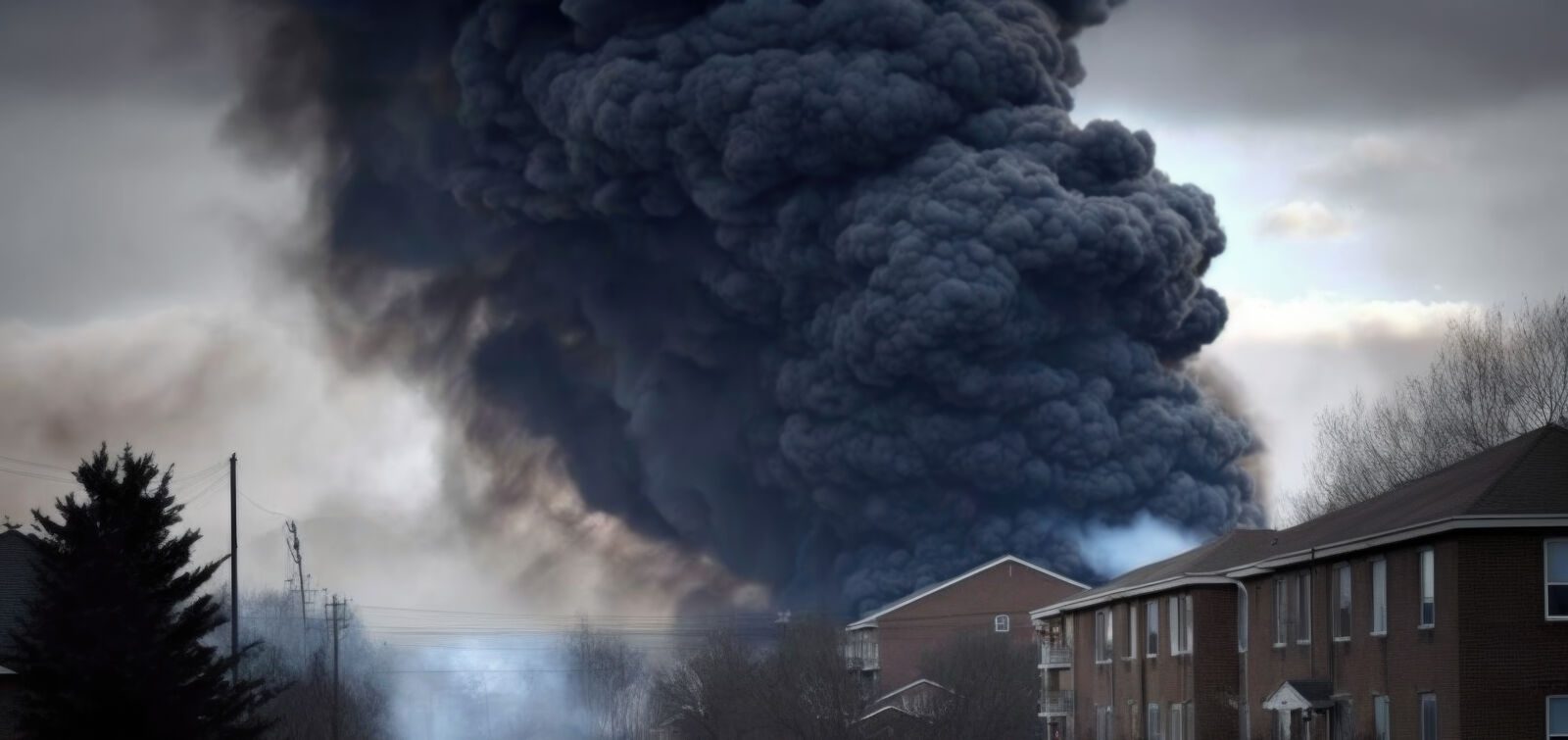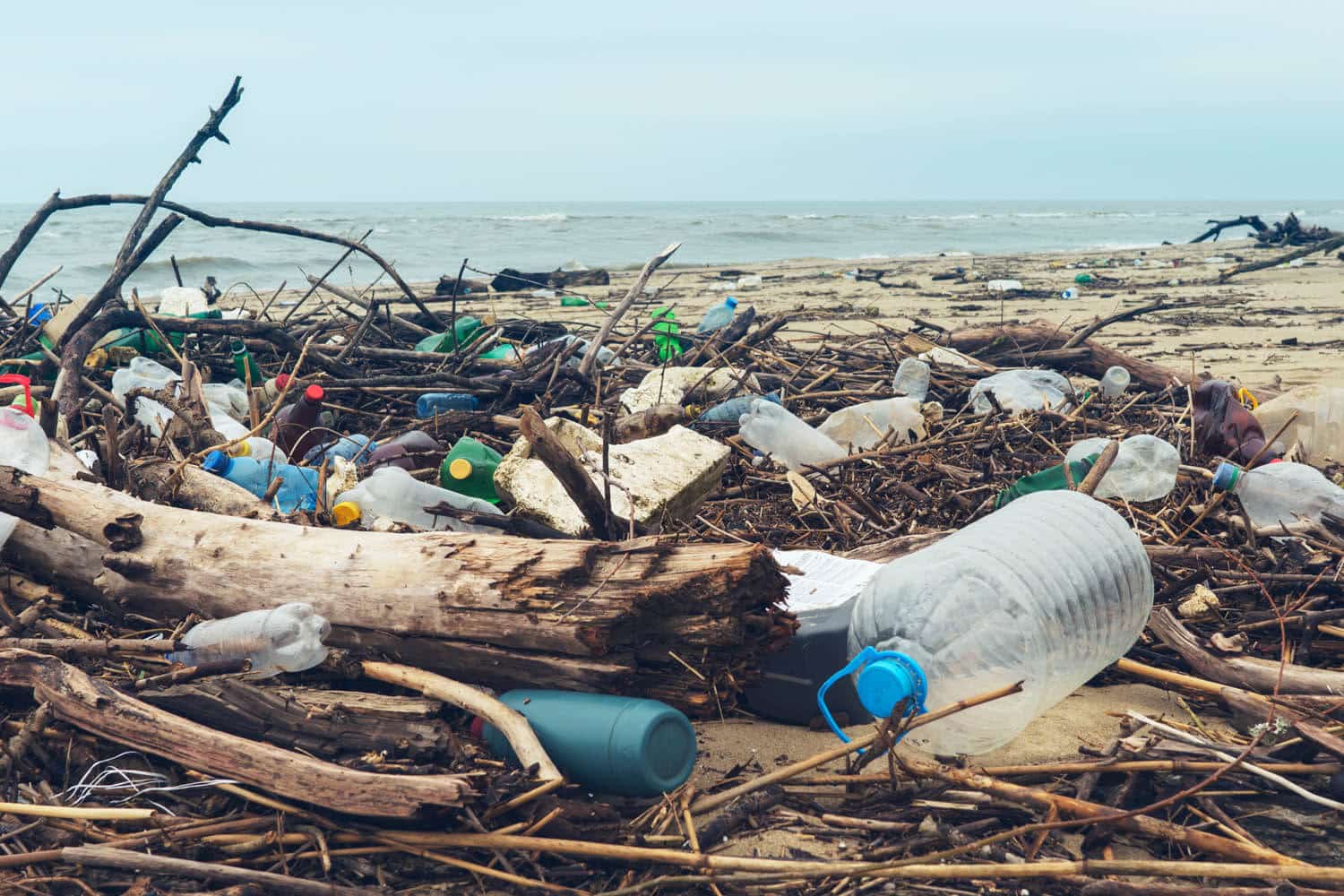Updated October 3, 2023
In less than 30 days, three trains carrying toxic plastics and chemicals derailed in the U.S.—two in Ohio (East Palestine and Springfield) and one in Van Buren Township, Michigan. News of a fourth Norfolk Southern derailment in Calhoun County, Alabama, made headlines following these events on March 8, 2023, just as the US Senate Environment and Public Works Committee convened a hearing on the catastrophic event in East Palestine.
Just days before the Calhoun County derailment, residents of Springfield—some living just 1,000 feet from the tracks—were placed under a shelter-in-place order, which has since been lifted, to prevent exposure to hazardous materials and chemicals. And while officials report that no such exposure risks exist, they have said that at least one train car spilled plastic polyvinyl chloride (PVC) plastic pellets—and these PVC pellets (nurdles) and the items they are used to create are in fact hazardous to human and environmental health.
In Van Buren Township, six cars of a 30-car train derailed in February just weeks after the disaster in East Palestine. While little information about this accident has been released, it’s known that at least one train car was carrying liquid chlorine, a “lung-damaging agent” (which was used as a chemical weapon during World War I) that could have caused serious environmental and potentially lethal human health effects if it had ignited or leaked.
The highly visible derailment in East Palestine that happened on February 3 has been deemed one of the worst environmental disasters in U.S. history. The event’s effects are serious and ongoing, and shed an unfortunate but necessary light on safety issues and a general lack of transparency existing around toxic and flammable plastics and chemicals carried by rail.
Train Derailment in East Palestine, Ohio: One of the Worst Environmental Disasters in U.S. History

Since February 3, the ignition and derailment of approximately 50 train cars carried by Norfolk Southern, holding polyethylene and polyvinyl plastics, and various chemicals used in plastics production (as well as other industrial materials and items, and food products) has released a yet unquantified amount of toxic chemicals and their byproducts into air, soils, and waterways in East Palestine, Ohio.
Immediately following the derailment, workers were ordered to intentionally open and ignite five rail-car tankers containing vinyl chloride to avoid a possibly catastrophic explosion that could have leveled the small rural town, releasing toxic compounds and shrapnel. Vinyl chloride is a highly unstable and toxic colorless gas used to create PVC. PVC is a common type of plastic found in packaging, wires, cables, pipes, flooring, and many other products. When burned, the vinyl chloride tankers released a large dark plume of gases including hydrogen chloride and phosgene (which, like chlorine gas, was also used as a deadly chemical weapon during the first World War) high into the atmosphere. These chemicals were released far and wide into air, waters, and soils, along with a mixture of toxins released from the other train cars that had breached and caught fire.
While people living within two miles of the East Palestine train disaster were evacuated for a short time in the derailment’s immediate aftermath, chemicals released are still being detected in the surrounding environment. People have reported finding dead fish in nearby waterways, dead and sickened pets, and many have said they are reporting chemical odors, headaches, and other health-related issues since the disaster occurred. While the full toxic impacts of this disaster are just coming to light, it’s important to know that people can be exposed to chemicals through inhalation in the air, absorption through the skin, and by consuming contaminated food and water. Transparent monitoring of environmental and human health of the numerous chemicals and their byproducts released will be essential to understand the long-term risks, which could be serious, according to experts and prevent further harm.
Frontline Communities in Ohio & Beyond Face Escalating Chemical Dangers

The East Palestine train disaster’s impacts continue to threaten frontline communities in Ohio and beyond. The waste created by the disaster is scheduled to be stored or disposed of in dangerous ways in close proximity to communities already overburdened by the presence and activities of an extensive array of hazardous petrochemical, chemical, and other industrial infrastructure and activities—resulting in serious injustice. Thus far, officials have made plans to ship the toxic wastes from the derailment firefighting operations and “cleanup” to:
• a deep hazardous-chemical injection well in the Houston Ship Channel in Deer Park, Texas
• a hazardous waste landfill in Van Buren Township, Michigan
• hazardous-waste disposal sites in other parts of Ohio including a deep injection well in Vickery, and incinerators in East Liverpool and Grafton
• a landfill in Putnam County, Indiana
Deep-injection chemical storage wells in the U.S., like the ones in Deer Park, Texas, and Vickery, Ohio, are among the most used and least expensive forms of disposal for hazardous chemicals and other liquid wastes (such liquids from oil and gas extraction and mining). in the U.S. More than 740,000 industrial injection wells were counted under the purview of the Environmental Protection Agency’s Underground Injection Control program by 2018, the most recent year for which data is available. Despite being so widespread across the country, these wells are notorious for being poorly regulated and unsafe, with a long history of scientific evidence linking their existence and use to earthquakes, groundwater contamination, and other serious hazards.
Fenceline communities, especially those in Texas, which leads the nation in uninsured and [is ranked] last in the nation for prenatal and maternal care, are forced to absorb the deadly costs of these toxic disasters. Waste transporter, Texas Molecular, has been the subject of 10 compliance investigations by the Texas Commission on Environmental Quality in the past five years. Texas Molecular has admitted that there is potential for this injected toxic water to the surface, stating: ‘Could it come up someday? Yes…’
–Fenceline Watch
The East Palestine train disaster is also affecting people’s physical and emotional health in eastern Ohio, western Pennsylvania, and far beyond. Adding insult to injury, industries—including Norfolk Southern, the rail-shipping company responsible for the three recent derailments—have downplayed and ignored the very real risks to people and the environment. These factors conspire to cause serious and life-threatening hazards to communities, and major harm to the environment that all life—including humans—need to survive.
In August 2023, the EPA stated it may launch a formal health and safety investigation of vinyl chloride in the near future. Meanwhile, six months after the train derailment, people living in East Palestine continue to report emotional and physical health problems tied to the disaster, and feel they have been left without reliable guidance.
By September 2023, President Biden issued an executive order requiring federal agencies to continue to hold Norfolk Southern accountable for its derailment and assign a FEMA official to oversee the community’s recovery. The East Palestine community continues to call for more serious action, the president has not yet declared the event as an official “disaster.”
How You Can Help: Immediate Aid and Systemic Solutions
Experts agree this disaster should be a wake-up call to the world about the dangers of continued plastics and petrochemical production. It has also prompted numerous increased safety measures, including from the Federal Railroad Administration and, a proposed railway safety bill. A National Transportation Safety Board investigation into Norfolk Southern’s “safety practices and culture” came a day before the March derailment in Calhoun County and Senate hearing, and sadly, also as news of a Norfolk Southern train conductor’s death due to a collision with a dump truck in Cleveland, Ohio, was announced.
Local groups are calling for help to assist impacted communities in the aftermath of this disaster. Here’s how you can help:
• Give directly to River Valley Organizing, Three Rivers Waterkeeper, Fair Shake Legal Services, and Kindred Spirits Rescue Ranch
• Follow and give to Beaver County Marcellus Awareness Community, which works to monitor and end the petrochemical buildout—including Shell’s recently built plastic and petrochemical facility—and harm to communities in the Ohio River Valley and far beyond
• Donate to support the distribution of free home air filters to people affected by the train derailment (people who are impacted can request an air filter here)
• Tell the EPA to test for dioxins and related toxic emissions caused by the burning of vinyl chloride and PVC plastic following the derailment in impacted communities, which has been strongly suggested by Judith Enck, former EPA regional administrator and president of Beyond Plastics
• Tell the governments of Ohio and Pennsylvania that the must take transparent and proactive actions to inform and support residents affected by the East Palestine train disaster
• Tell the EPA and Norfolk Southern to “stop burning toxic chemicals from East Palestine train derailment in our community” to prevent the impacts of this crisis from expanding
• Sign the Hip Hop Caucus’ petition to stop the expansion of the petrochemical industry which drives continued pollution and injustice
• Clean Air Council is working to limit chemical exposure within the homes of impacted residents by providing whole-home HEPA rated activated carbon air purifiers. Support Clean Air Council’s Direct Relief Fund
• Familiarize yourself with what the community needs in the wake of the disaster
In addition to helping frontline communities in the wake of disasters, we must also call for systems-level change so that harm can be stopped and avoided in the first place. We need to end wasteful plastic and petrochemical production and expansion and push back as industries build up a vast and highly hazardous network of plastic and chemical railways, highways, pipelines, injection systems, and other toxic artificial arteries which are changing the very nature of the planet and our bodies.
You can advocate for a healthy, just, regenerative world free of plastic pollution and divested from fossil fuels. Get the facts, learn about solutions, and take action.






